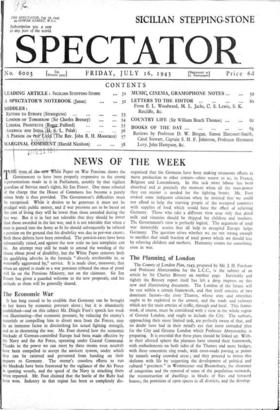The Economic War
It has long ceased to be credible that Germany can be brought to her knees by economic pressure alone ; but it is abundantly established—and on this subject Mr. Dingle Foot's speech last week was illuminating—that economic pressure, by reducing the enemy's materials or compelling him to divert men from the Forces, may be an immense factor in diminishing his actual fighting strength, and so in shortening the war. Mr. Foot showed how the economic blockade of German-controlled Europe had been made effective by the Navy and the Air Force, operating under Coastal Command. Thanks to the power we can exert by these means even neutrals have been compelled to accept the navicert system, under which they can be rationed and prevented from handing on their imports to Germany. The enemy's ceaseless efforts to run the blockade have been frustrated by the vigilance of the Air Force in spotting vessels, and the speed of the Navy in attacking them when reported. Mr. Foot claimed that the battle of the Ruhr had been won. Industry in that region has been so completely dis- organised that the Germans have been making strenuous efforts to move production to other centres—often nearer to us, in France, Belgium and Luxembourg. In this task more labour has been absorbed and at precisely the moment when all the man-power they can muster is needed for the fighting fronts. Mr. Foot evoked some indignant criticism when he insisted that we could not afford to help the starving people of the occupied countries with supplies of food which would have the effect of relieving Germany. Those who take a different view urge only that dried milk and vitamins should be shipped for children and mothers. The Government's view is perfectly logical. The argument of total war inexorably asserts that all help to occupied Europe helps Germany. The question arises whether we are not strong enough to sacrifice that small fraction of total power which we should lose by relieving children and mothers. Humanity counts for something, even in war.


























